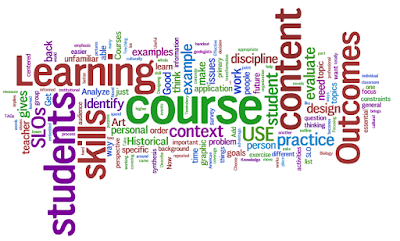Thoughts on Teaching and Learning
 For a five week online course I am developing as a student in an Instructional Design in Online Learning course, I am planning on implementing some of the ideas I discussed in my innovation plan and researched for my literature review "Interactivity and Collaboration in Learning Management Systems: An Analysis to Support an Action Research Plan". My plan was to integrate more collaboration and interactive Web 2.0 tools into the curriculum for a mandatory undergraduate course (EDUC 1300 - Learning Framework). As this course is offered at the college during summer 5 week sessions, I thought it would be a great opportunity to basically build the course as I have imagined it in the innovation plan, using the same Canvas LMS and course outcomes as the institution. While I have not had the opportunity to teach an online course, I have used some flipped classroom activities while teaching, and led some hybrid professional development activities.
For a five week online course I am developing as a student in an Instructional Design in Online Learning course, I am planning on implementing some of the ideas I discussed in my innovation plan and researched for my literature review "Interactivity and Collaboration in Learning Management Systems: An Analysis to Support an Action Research Plan". My plan was to integrate more collaboration and interactive Web 2.0 tools into the curriculum for a mandatory undergraduate course (EDUC 1300 - Learning Framework). As this course is offered at the college during summer 5 week sessions, I thought it would be a great opportunity to basically build the course as I have imagined it in the innovation plan, using the same Canvas LMS and course outcomes as the institution. While I have not had the opportunity to teach an online course, I have used some flipped classroom activities while teaching, and led some hybrid professional development activities.As is have progressed through my career as an educator, I have approached teaching and learning through the process of social constructivism, which combines the ideas of constructivism and social interaction. According to constructivist theory, knowledge and understanding are constructed by a learner's experiences . The zone of proximal development, defined by Vygotsky, describes what a learner can accomplish through social interaction, because it is beyond their current skill or developmental level; exposure to a concept or task with the help of a more capable person, eventually helps as student gain the ability individually. The idea of social constructivism bridges these two ideas: social interaction allows learners to internalize the knowledge, understanding, and skill of a task when collaborating with peers. Interaction with peers engages the learner, and makes it easier for them to approach a novel idea or task. This will allow them to develop an ability, first as a part of a group, then individually. This is a peer-mediated process that is different from the individualistic construction of knowledge that was described by Piaget. Social constructivism has influenced me to design curriculum and learning activities that incorporate collaboration and social interaction as part my instructional practice.
I feel that social learning and constructivism can also be extended to the idea of multiple intelligences, as described by Gardner. By the process of individuation, educators can take the different “intelligences” into account and allow them to learn in ways that are best suited to their abilities and experiences, and assess them in ways which allow them to show their mastery. Through pluralization, each learner in the community can take on a different aspect of a topic that is being taught. Learners representing the various form of multiple intelligence can then collaborate further on the topic to arrive at a shared understanding of the “big picture ideas” in a particular topic. Each learner in the community will gain the ability to understand, describe, represent and embody the topic in multiple ways, allowing them to accomplish a greater level of mastery than they could by themselves. I want to engage students by creating connections within a community of learners, using innovative techniques in digital learning and enhance and accelerate the development of their college-ready and technology skills.
Reading Teaching the Digital Age, I found it interesting that when discussing the knowledge-based society, Bates addressed the difference between academic knowledge and applied knowledge. Academic knowledge refers to fields such as mathematics, science and humanities, while applied knowledge is found in fields such as business, law, engineering and education. When one considers traditional high school curriculums, they seem to highly emphasize academic knowledge with the core requirement of English, math, science and social studies. Educators need to incorporate strategies to turn this academic knowledge into applied knowledge with a focus on skills in the areas of collaboration, problem-solving, 21st century technologies and college and career readiness.

Comments
Post a Comment